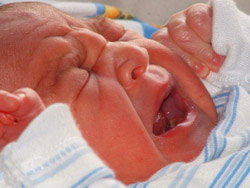 February 24, 2011
February 24, 2011
Of necessity, infants unable to put food in their own mouths are totally me-centered, able only to squall for attention. Transformation into socially responsible adults begins with parental responsibility. More and more people nudge us along in due course. But the key to our development is our own attitude. Do we continue becoming more outward looking, expanding responsibility (or accountability), or do we never escape being centered on me, or on my limited group, family, gang, tribe, or company?
Of course, were we totally altruistic or totally selfish we wouldn’t stay alive very long, so we’re partly both. Using different languages and symbols, how we balance these extremes and engage in deception doing it or not is the story of life, which runs through politics, nursery rhymes, opera, economics, ethics, law, war, art, medicine, religion, crime – everything we do, or don’t do.
What does this have to do with Compression? If we really must preserve human life using a limited stock of resources, we must become much wiser using them and more responsible for everyone’s welfare, not just our own. Technically, that’s huge. Emotionally accepting responsibility to do this is bigger, an unparalleled, mind boggling human revolution, ripping away the hidden assumptions of unending expansion, and the wasteful systems that promote it. Instead we take on a global view of ourselves as temporary occupants and caretakers of spaceship earth.
To learn how to do more using much less, we need vigorous learning organizations. Vigorous implies taking responsibility to perform something vital to society as best we collectively know how. Learning in this sense implies more than pure technology or procedures. Learning to do the right thing at the right time for everyone’s long term benefit is a professional responsibility to the world, a bigger benefactor than myself, or my group, family, gang, tribe, or company. Adherence to procedure, to standard work, or to regulation is good, but insufficient. We must learn to use the best professional judgment we can muster.
Within a vigorous learning organization everyone, or almost everyone must do more than perform X tasks for Y dollars, or elbow others clambering up a status ladder. Professional attitude does not soak in automatically from years of specialized education. It does lead to learning intently on the job, every day. Then, with an organizational mission to point direction and methods for systemic learning, an organization’s collective performance greatly improves.
This is a huge change in value systems. Expanding responsibility runs counter to current thinking in almost any work organization. Daily habits constantly undermine it. For example, both P&L statements and public budgets measure the effect of us capturing resources from the outside world for our own benefit. They don’t measure our effect on the world.
That this is challenging is an understatement. To see the effects of everyone being in business only for themselves during a minor pinch, just re-read the news, from Cairo to Madison. Then ask what will happen if shortages become serious.
If you have time to pile one more book in your reading, pick up Practical Wisdom by Barry Schwartz. It presents similar ideas in the context of today’s world, if not that of Compression. Many books by Russell Ackhoff address the same issues.
